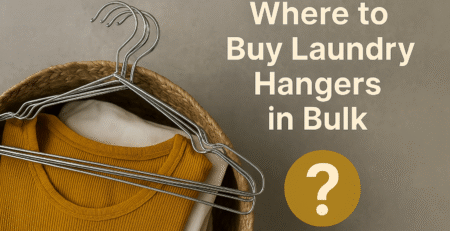Wire Hangers Wholesale: A Complete Buying Guide 2025
Wire Hangers Wholesale: A Complete Buying Guide 2025
Table of Contents
| Section Number | Heading |
|---|---|
| 1 | Introduction |
| 2 | Understanding Wire Hangers |
| 3 | Types of Wire Hangers |
| 4 | Materials and Construction |
| 5 | Selecting Wire Hangers Based on Business Needs |
| 6 | Sizing and Dimensions |
| 7 | Customization Options |
| 8 | Bulk Purchasing and Cost Considerations |
| 9 | Environmental Considerations |
| 10 | Maintenance and Storage |
| 11 | Common Mistakes to Avoid |
| 12 | Conclusion |
| 13 | FAQs |
1. Introduction
Selecting the right wire hangers is crucial for businesses like dry cleaners, garment manufacturers, and retailers. The appropriate hanger not only supports the garment but also reflects the quality and professionalism of your service. This guide aims to provide comprehensive insights into choosing the best wire hangers tailored to your business needs.
2. Understanding Wire Hangers Wholesale
Wire hangers are a staple in the garment industry due to their simplicity, cost-effectiveness, and versatility. They are primarily used for hanging clothes in a way that maintains the garment’s shape and prevents wrinkles.
Benefits of Wire Hangers in Commercial Settings
Space Efficiency: Their slim design allows for maximizing storage space.
Cost-Effective: Generally more affordable than plastic or wooden alternatives.
Durability: High-quality wire hangers can support various garment weights.
3. Types of Wire Hangers
Standard Wire Hangers
These are the most common type, typically made from a single piece of wire. They are suitable for lightweight garments like shirts and blouses.
Caped Wire Hangers
Featuring a paper or cardboard cape, these hangers provide additional support and prevent creasing, making them ideal for delicate garments.
Notched Wire Hangers
Designed with notches on the shoulders, these hangers are perfect for garments with straps, such as dresses and tank tops.
Heavy-Duty Wire Hangers
Constructed from thicker wire, these hangers are capable of supporting heavier garments like coats and suits without bending.
4. Materials and Construction
Steel Wire Hangers
Known for their strength and durability, steel wire hangers are suitable for heavy garments and long-term use.
Aluminum Wire Hangers
Lightweight and resistant to corrosion, aluminum hangers are ideal for humid environments.
Coated Wire Hangers
These hangers have a plastic or rubber coating that prevents rust and provides a non-slip surface to keep garments in place.
5. Selecting Wire Hangers Based on Business Needs
Dry Cleaners
Consistency and quality are paramount. Using standardized, high-quality hangers ensures customer satisfaction and maintains garment integrity.
Garment Manufacturers
Hangers must support the garment’s shape during storage and transport. Custom-sized or shaped hangers may be necessary for specific clothing lines.
Retailers
Aesthetic appeal is important. Branded or color-coordinated hangers can enhance store presentation and reinforce brand identity.
6. Sizing and Dimensions
Choosing the correct hanger size is essential to maintain garment shape:
16-inch hangers: Suitable for children’s clothing.
18-inch hangers: Ideal for standard adult garments.
20-inch hangers: Best for larger or plus-size clothing.
7. Customization Options
Custom hangers can include:
Branding: Adding logos or brand names.
Color Coding: Using different colors for size or style differentiation.
Unique Shapes: Tailoring hanger shapes to specific garment types.
8. Wire Hangers Wholesale Purchasing and Cost Considerations
Buying wire hangers wholesale can lead to significant cost savings. However, it’s important to balance cost with quality to ensure durability and customer satisfaction.
9. Environmental Considerations
Wire hangers are recyclable, making them an eco-friendly option. Implementing a recycling program can enhance your business’s sustainability efforts.
10. Maintenance and Storage
Proper storage of wire hangers prevents deformation:
Avoid Overloading: Do not hang multiple heavy garments on a single hanger.
Store in Dry Areas: Prevents rusting, especially for non-coated hangers.
11. Common Mistakes to Avoid
Using the Wrong Hanger Type: Mismatched hangers can damage garments.
Neglecting Material Quality: Low-quality hangers may bend or rust, affecting garment appearance.
12. Conclusion
Choosing the right wire hangers is a vital aspect of garment care in any business. By understanding the different types, materials, and customization options, you can select hangers that meet your specific needs, enhance your brand image, and ensure customer satisfaction. Get Quote
13. FAQs
1. What is the best material for wire hangers in humid environments?
Aluminum wire hangers are ideal due to their corrosion resistance.
2. Can wire hangers be recycled?
Yes, most wire hangers are recyclable. Check with local recycling programs for specific guidelines.
3. How can I prevent garments from slipping off wire hangers?
Using coated wire hangers or adding non-slip attachments can help keep garments in place.
4. Are there wire hangers suitable for heavy garments like coats?
Heavy-duty wire hangers made from thicker wire are designed to support heavier garments without bending.
5. Is it cost-effective to purchase wire hangers in bulk?
Yes, bulk purchasing often reduces the cost per unit and ensures a consistent supply for your business needs.
Visit: Instagram









